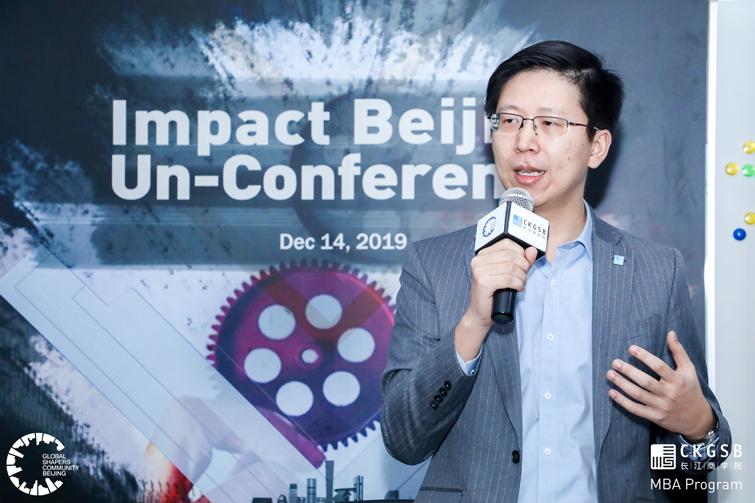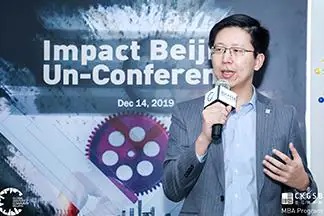An Interview with Professor Fan Xinyu

Interested in game theory and its applications in political economy and organizational economics, Assistant Professor of Economics Dr. Fan Xinyu joined CKGSB after receiving his Ph.D. in economics from the University of California, Los Angeles (UCLA) in 2018. We sat down with Professor Fan to discuss economic history, COVID-19, and the importance of game theory for future business leaders.
1.One of your research topics focuses on economic history, so could you share with us how you see the COVID-19 pandemic and the imminent economic crisis through the lens of history?
A. An interesting strand of literature on economic history discusses the long-term impact of the great plague (the Black Death) in the 14th century on the economic development of Europe. The Black Death took away more than one third of Europe’s population, which made labor force scarce. The scarcity in labor in turn made capital-intensive and labor-saving technological improvement much more valuable than ever before, because labor-intensive production was no longer efficient. This later contributed to the industrial revolution that has shaped our modern world. The story reminds us to look for the silver lining in this crisis, and be mindful of the long-term structural changes.
2.How will this crisis reshape the future economic environment? What are the main lessons that enterprises and organizations could learn from?
A. To end a pandemic which spreads across the globe (or in economics terms, features significant “negative externality”), more cooperation is needed, not less. More trust is needed, not less. It might be natural to close one’s doors initially. But in the end, it requires joint efforts to create a healthy community. Speaking to corporations and other organizations, the takeaway is quite similar: one could concentrate on splitting a larger slice of a shrinking pie, but in the long run, the one that enlarges the pie will have a nicer meal.
3.As a professor who also focuses on political economy, what do you think of the ways in which governments and organizations are dealing with the crisis? Could you give some examples?
A. There are numerous scholars sharing their insights on the subject but personally, I would like to emphasize the mindset of “knowing what you do not know” in dealing with the crisis. This means: 1. Respect expert opinions and scientific approaches (which may involve some trial and error), and let the professionals make decisions; 2. Let information flow, and let people be informed before they make their own choices; 3. In Churchill’s words, “success is not final, failure is not fatal, it’s the courage to continue (and to explore the wrong decisions made, in order to prevent making future ones) that counts”.
4.Why did you decide on focus on political economy for your research?
A. I study the strategic interactions between individuals (people, corporations, governments, nations, etc.), and how a greater good may be created in spite of cold-hearted games and calculations. To twist the famous saying of Robert Lucas (Nobel Laureate of Economics, 1995) a little bit, “Once you start thinking about it, it is hard to think about anything else.”
5.Tell us why you chose to come back to China and join CKGSB? What excites you about teaching at CKGSB?
A. As a game theorist, I believe I need to be close to the real-life stories of my study, and China is “where the amazing happens”. It may be good, it may be bad, but all of it is thought-provoking. Once I made the decision to return to China to further my academic research, CKGSB stood as THE BEST choice, period. The school provides unparalleled academic freedom and students coming from diverse backgrounds who offer insightful life stories. I couldn’t have asked for a better environment.
6.What is the importance of having Management Economics as a compulsory course for MBA students at the beginning of their MBA journey?
A. The importance cannot be emphasized enough. For starters, it provides a big picture of how the market works, what the key problems and concerns in management are, and draw out a framework for future in-depth investigations. It is particularly useful at the beginning of the MBA journey because it serves as a road map to understanding general management issues. In this sense, the course lays the foundation of the way you approach various problems in the future.
7.What’s the importance for MBA students or future business leaders to understand game theory and how it relates to current affairs?
A. Well, in Chinese, the word “economics” originally means “the craft to create a better world for the people.” So I feel obliged to discuss current affairs in class, and analyze the economic rationale and the strategic interactions involved. It is also a great way to learn, in my opinion, and relate the theoretical approaches to real-life applications. This way we can cultivate socially responsible business leaders – a duty we don’t take lightly.
8.Can you share an example of how you teach economic theories that are harder to grasp?
A. “All theory, dear friend, is gray, but the golden tree of life springs ever green.” (Goethe, in Faust)
I think it’s always best to relate theory to real-life, and often, current events give us a better understanding of real-life application. For instance, when we talk about monopolistic pricing, I asked student to watch the movie “Dying to survive”, in order to understand the concepts in patent drug pricing. Moreover, I aim to cultivate a sense of corporate social responsibility during the process: theory is dry, knowledge is useful, application is fun, and “there is some good worth fighting for”.
9.What sets CKGSB’s Global MBA students apart from the rest?
A. What I think set the students in our global MBA program apart is their entrepreneurial spirit: They dare to think, dare to criticize, dare to create, dare to achieve, dare to be.
10.Tell us something interesting about yourself that students may not know about?
A.This is indeed the hardest question of the interview… I have been coping with myself for so long that I do not find myself particularly interesting. However, I keep discovering the things (and the people) around me to be fascinating.




















